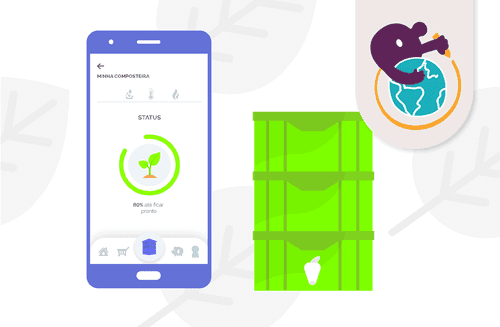
03/07/2021
Circular Movement awards contest winners
What would you do to create a world without garbage? Febrace received dozens of projects in the first half of 2021 about a new way for the world to work, which were selected for the 1st Prize For A World Without Garbage. The top three winners won a three-class course on circular economy. The great champion also received another super prize: a mentoring on his project, carried out by the Circular Movement.
The chosen project was created by 18-year-old Digital Design student Vitor Ramos, in partnership with colleagues Gabrielle Barbosa and Mateus Pádua. The work, supervised by professor Sérgio Marques, was carried out at the end of 2020, as a Course Conclusion Work (TCC) for students and ended up being baptized as SmartHummus. It is an automated home composter integrated with a mobile app.
“The compost bin is a structure with three stacked boxes where composting takes place, that is, the transformation of organic matter into organic compounds that can be used as fertilizer and slurry,” explained Vitor. “In this process, we used worms and the differential of our project is that we seek to use the concept of IOT, the internet of things, because we saw a great potential for their use in composting”, he continued.
SmartHummus has sensors that inform through the application data such as temperature, humidity, level and the gases produced. The target audience, explains the student, are people who keep vegetable gardens or gardens in their homes.
When he won the award, Vitor says that the group had no great intentions of moving the project forward, but after the classes given by the Circular Movement and the mentoring that the young people received, this reality changed. “The classes gave me a good insight into circular economy that I didn't have before. We were able to see much better how our project fit into this. The mentoring with Professor Edson Grandisoli and Vinicius Saraceni made us see the potential of our project individually, solving technical doubts we had and teaching how we could present our idea to interested parties.”
Professor Dr Edson Grandisoli, who is part of the Circular Movement, says that he was happy to see young people awakening to the circular economy. “They were not provoked into creating projects specifically on this theme, but when we saw the entries, much of it had to do with the circular economy. It was a pleasant surprise. During the classes, they were able to make the relationship between the subject and the projects they developed”, said the professor.
For Vinicius Saraceni, coordinator of the Circular Movement, initiatives such as the Febrace award encourage dialogue on the circular economy and the participation of young people in building a more sustainable world. “We increasingly want to bring society together, with the aim of bringing this agenda to more and more people who help us create solutions for building a world without garbage,” he argued.
Translated with Google Translate

